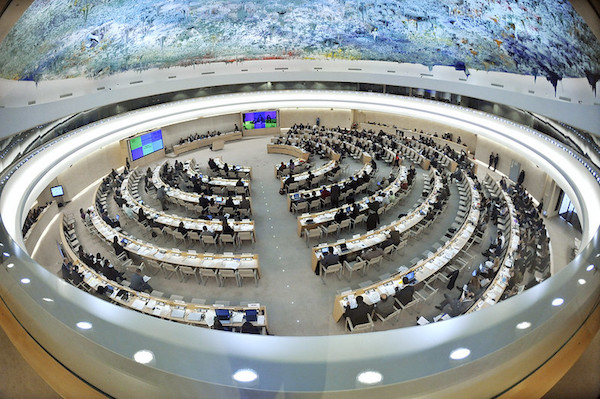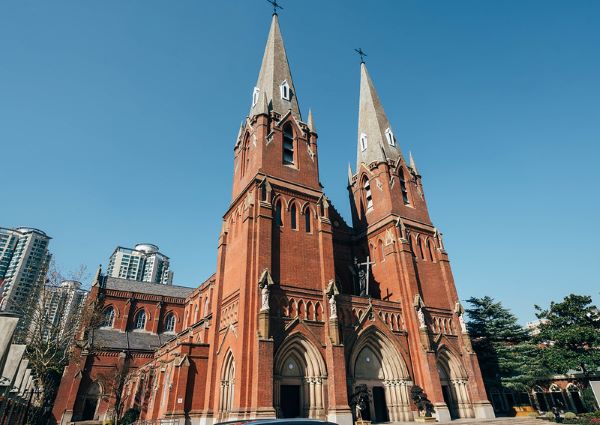Pope Francis has decided to approve the appointment of the Bishop of Shanghai installed by the Chinese authorities without the Vatican’s approval.
The Holy See’s Secretary of State Cardinal Pietro Parolin announced on Saturday that Pope Francis wanted to “remedy the canonical irregularity created in Shanghai, in view of the greater good of the diocese and the fruitful exercise of the bishop’s pastoral ministry”.
Parolin said that the Pope’s “intention is fundamentally pastoral” and will allow the bishop to “work with greater serenity to promote evangelisation and foster ecclesial communion”.
Bishop Joseph Shen Bin was installed in Shanghai in April in violation of the Holy See’s provisional agreement with Beijing on episcopal appointments. It was the second unauthorised appointment by Chinese authorities in the past year.
Pope Francis formally confirmed Shen Bin for the Shanghai post on 15 July.
Parolin said that the Vatican decided “to take time before publicly commenting on the case” to evaluate the pastoral situation in Shanghai, which has been without a bishop for over a decade.
In an interview with Vatican News, Parolin said that it is “indispensable that all episcopal appointments in China, including transfers, be made by consensus, as agreed, and keeping alive the spirit of dialogue” between the Holy See and China.
The Holy See first entered into a provisional two-year agreement with Beijing on the appointment of bishops in 2018, which was renewed in 2020 and again in 2022.
One month after the Holy See agreed to renew the deal last October, the Vatican said that Chinese authorities violated the terms stipulated in the agreement by installing Bishop John Peng Weizhao as an “auxiliary bishop of Jiangxi”, a diocese that is not recognised by the Vatican.
Parolin explained that the text of the provisional agreement has been kept confidential “because it has not yet been definitively approved”.
“It revolves around the fundamental principle of consensual decisions affecting bishops,” he said.
“We are, therefore, trying to clarify this point, in an open dialogue and in a respectful confrontation with the Chinese side.”
When asked what other topics need to be discussed with China, Parolin listed evangelisation, the bishops’ conference and the communication between Chinese bishops and the Pope.
The cardinal called for a Chinese bishops’ conference with “statutes appropriate to its ecclesial nature and pastoral mission” and the establishment of regular communication between Chinese bishops and the Pope.
“In fact, it must be said that too many suspicions slow down and hinder the work of evangelisation: Chinese Catholics, even those defined as ‘underground’, deserve trust, because they sincerely want to be loyal citizens and to be respected in their conscience and in their faith,” Parolin said.
Despite the violations of the agreement, Parolin added that the Holy See is “determined” to continue dialogue with China.
“Indeed, the dialogue between the Vatican side and the Chinese side remains open and I believe that it is a path that is in some way obligatory,” he said.
“In order to make it smoother and more fruitful, it seems to me that the opening of a stable liaison office of the Holy See in China would be extremely useful.
“I take the liberty of adding that, in my opinion, such a presence would not only favour dialogue with the civil authorities but would also contribute to full reconciliation within the Chinese Church and its journey towards desirable normality.”
Shen Bin, 53, was consecrated bishop in 2010 with the consent of both the Pope and Chinese authorities. He served as Bishop of Haimen until April this year, when he was transferred to Shanghai “without the involvement of the Holy See”.
Since 2022, Shen Bin has been the president of a group called the Council of Chinese Bishops, a state-sanctioned bishops’ conference not recognized by the Vatican. He previously was the vice president of the Chinese Catholic Patriotic Association (CCPA) established by the Chinese Communist Party and under the control of the United Front Work Department.
One month after Shen Bin’s installation, officials from the Chinese People’s Political Consultative Conference visited Shanghai to evaluate the progress of “sinicisation” in the diocese.
In his installation ceremony, the bishop said that he would “continue to carry forward the fine tradition of patriotism and love of the Catholic Church in Shanghai, adhere to the principle of independence and self-government, adhere to the direction of my country’s Catholicism in China, and better promote the healthy inheritance of Shanghai Catholic evangelisation”.
The Diocese of Shanghai has been functionally vacant since the death of Bishop Aloysius Jin Luxian in 2013. Jin was made Bishop of Shanghai in 1985, during Deng Xiaoping’s liberalisation, but he was not recognised by the Holy See until 2005.
Bishop Joseph Xing Wenzhi, who was ordained with papal and government approval, was made auxiliary bishop of Shanghai in 2005 in apparent expectation of succeeding Bishop Jin, but disappeared from the public in 2011.
Bishop Thaddeus Ma Daqin, Xing’s successor as Shanghai auxiliary, denounced the CCPA during his ordination mass on 7 July 2012. That night he was put under house arrest in the Sheshan Seminary, where he remains to this day.



 Loading ...
Loading ...